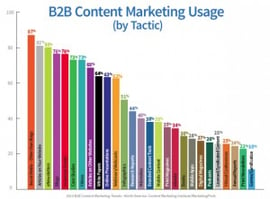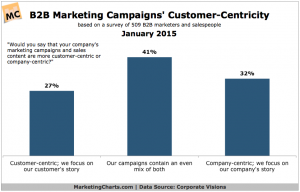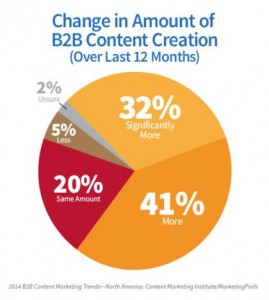

J&C Blog
Find all the latest marketing trends on the J&C Blog.

Find all the latest marketing trends on the J&C Blog.
B2B marketing teams report spending more than 25% of their budget on the creation, promotion and delivery of all forms of content intended to drive leads, enhance brand presence and reinforce their authority.1 Despite allocating more of their budget to content marketing, some companies engaged in B2B marketing don’t always remember that content is most effective when it’s set on a deliberate course. Content marketing tends to be most effective when it is a customer-centric, goal-oriented communication model to attract and retain B2B audiences. Here are 5 reasons that B2B content marketing may be devolving instead of evolving.
1. Publishing only one or two types of content instead of multiple forms of content.
The majority of B2B content should focus on providing quantitative information that shows how services and products help customers succeed at their own business. Although 7% of marketers claim their content contains statistically oriented customer stories, research results or case studies, only 3% say this is the kind of content they primarily concentrate on and develop.2 
The reality is that there are a number of different content marketing tactics and it’s unlikely that only one format will appeal to all users. Blog articles, ebooks, videos and webinars all serve different purposes in the marketing mix, and are likely to align with different audiences. The chart to the right from MarketingProfs demonstrates that every audience and every user isn’t the same. Digital marketing techniques, such as B2B infographics, have increased from 38% to 51% over the past two years.3
2. Content marketing is not copywriting.
Too much B2B content is self-serving, "sale-sy" content that is fixated on promoting the company and its brand or products. The MarketingCharts stats to the right reinforce that content must work harder to be customer-centric. While four out of five businesses say that they do communicate regularly with their customers, 30% admit content purposely advocates their brand instead of being derived around customers’ needs.
B2B content marketers should embrace customer-centric content. Content marketing is not meant as a vehicle to expound on the superiority of a company’s brand or product by simply stating facts; instead, content marketing should prove it. B2B buyers want to know how a product or service will solve problems they have within their business.
3. Content that is uninformative, ambiguous and "fluffy."
Filling a webpage with a few buzzwords and slick-sounding sentences won't trick B2B users into thinking this content is informative, meaningful or useful. White papers are especially valuable as a B2B content marketing tool, but may be intimidating to certain audiences that consider themselves time-compressed.
Content marketing can be one of the most effective digital marketing techniques for lead generation and cultivation; the key is to ensure content provides value. B2B decision makers like to see where they stand relative to the rest of the market. Research studies published by professional organizations are the most trusted and valued type of content, according to a survey by the CMO Council. Other highly respected content types include analyst reports, independent product reviews and case studies.4
4. Overly technical writing that is dry, boring and, well--unreadable.
It’s important to ensure that you’re speaking the language of your audience, not demonstrating the expertise level of the author. By nature, most authors of content are subject matter experts; they know more than the audience. It’s critical, however, to construct the information in a user-friendly way that speaks directly to the audience. To learn more about different ways to speak to audiences through content marketing, click the button on the left to get our 22 Great Types of Content Marketing free download.A fine line exists between successful and shareable content that gives the audience useful but not too much information. One of the best aspects of content marketing is that it can provide users a vehicle to get additional information. Consider driving users to a downloadable piece of content such as an ebook that elaborates on topics that have generated engagement.
5. B2B content marketers don't publish enough content.
Every minute, hundreds of millions of new words  are uploaded to websites in the form of a content tactic. When someone submits a query to Google's search algorithm, it starts sifting through new and old content for certain words and phrases inspired by the user's query. If Google finds that a website has remained unchanged for a while, it starts to think the website is not timely and no longer relevant. This may result in a reduction in traffic and visitors.6
are uploaded to websites in the form of a content tactic. When someone submits a query to Google's search algorithm, it starts sifting through new and old content for certain words and phrases inspired by the user's query. If Google finds that a website has remained unchanged for a while, it starts to think the website is not timely and no longer relevant. This may result in a reduction in traffic and visitors.6
Although it can be a challenge, new content should be posted weekly, if not three to four times a week. Making a commitment to the right frequency will help ensure content marketing success. Frequency plays a critical role in the success or failure of this digital marketing technique. 73% of B2B marketers are producing more content now compared to what they were publishing a year ago.7
Topics: Content Marketing
303 E Wacker Drive, Suite 2030
Chicago, IL 60601
Phone: 312-894-3000
Fax: 312-894-3005